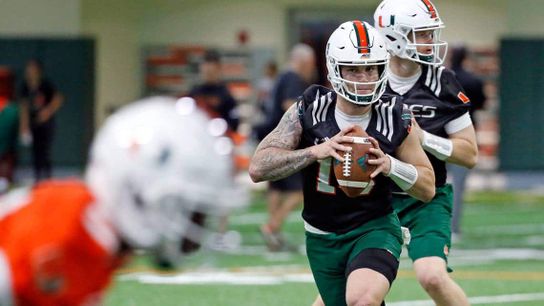It's important to know that Tate Martell's attorney, the Phoenix-based Travis Leach, does not believe his client's waiver will open the floodgates to full-on college football free agency. Of course, if a broken Humpty Dumpty was discovered splayed on the ground and you happened to be a lawyer, it'd be your job to assure the townspeople those are not your client's fingerprints on his back.
Still, Leach believes there are specifics to this case that will keep the floodgates closed. Specifically, that Ohio State made no effort to keep Martell after Justin Fields arrived in early January.
“This was a fact and circumstances case,” Leach told the Miami Herald. “I don’t think this is something you will see a wholesale change to the way people look at [NCAA transfer cases]. It was a unique situation.”
Additionally, a Miami source told the Herald that Ohio State made no effort to keep Martell once he notified Buckeyes coaches of his desire to leave.
Of course, that may not make Martell's case that unique. According to a January Associated Press study, 50 of the 63 applicants (79 percent) have been granted waivers since the Division I Council passed its new guidelines last April.
But the uniqueness of Martell's case isn't the point. In fact, it's the opposite. If a player is recruited over by a new coaching staff, he'd like to leave and his departing school doesn't contest his departure, well, who is it hurting if Martell is immediately eligible? If Ohio State doesn't care if Martell plays for Miami in 2019, and the NCAA doesn't care, why should we? Who, exactly, is hurt by this decision?
One group that's hurt is all the former Tate Martells who were recruited over at their original schools but had to sit out a year anyway. And, sure, that group may have a legitimate gripe, but there's nothing to be done for them at this point regardless. Even before last April, the NCAA had liberalized its transfer rules in the years leading up to most recent, loosest change -- unless you think it's a coincidence that so many players happened to have sick relatives in the general vicinity of a depth chart opening.
Another group that's hurt by the transfer loophole is coaches, and their argument has, arguably, the most merit. Even as public sympathy switches from coaches in favor of players, coaches still have a job to do. There are only so many carries, passes and snaps to go around, and they're the ones that have to decide who gets them and who doesn't. These are inarguable facts of sports. Such decisions are going to leave some happy and others not, and amid all that coaches have to build a culture and a team among their group of players, some of whom are always going to be happier with their lot in life than others. Again, I'm not telling you anything you don't already know.
Given all that, it would be immensely more difficult if every player on their roster had to be re-recruited at all times. And if the only thing standing between a typical undergraduate back-up and immediate eligibility elsewhere was the objection of their current school, it would tip the scales dramatically in favor of the players.
Perhaps you, beloved reader, are ready for that. The bulk of coaches most certainly are not, and the Powers That Be writing the rules of the NCAA don't appear to be either, given the Valentine's Day announcement that the organization would take another look at latching the door they opened last April.
